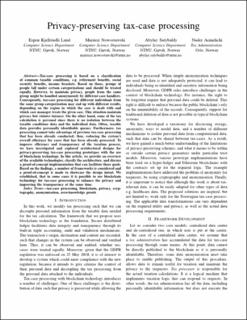| dc.contributor.author | Kjellstadli Lund, Espen | |
| dc.contributor.author | Nowostawski, Mariusz | |
| dc.contributor.author | Satybaldy, Abylay | |
| dc.contributor.author | Aeinehchi, Nader | |
| dc.date.accessioned | 2021-02-19T07:38:38Z | |
| dc.date.available | 2021-02-19T07:38:38Z | |
| dc.date.created | 2021-01-27T20:55:32Z | |
| dc.date.issued | 2019 | |
| dc.identifier.isbn | 978-1-7281-3265-5 | |
| dc.identifier.uri | https://hdl.handle.net/11250/2729068 | |
| dc.description.abstract | Tax-case processing is based on a classification of common taxable conditions, e.g. retirement benefits, social security benefits, income brackets. Based on those, groups of people fall under certain categorizations and should be treated equally. However, to maintain privacy, people from the same group might be handled anonymously by different case handlers. Consequently, tax-case processing for different individuals from the same group categorization may end up with different results, depending on the region in which the case is dealt with and which case manager treats the given case. This situation maintain privacy but violates fairness. On the other hand, some of the tax calculation is personal since there is no isolation between the taxable conditions data and the individual data. Often, taxable data provides personally identifiable queues. Furthermore, tax processing cannot take advantage of previous tax-case processing that has been already conducted; thus, reducing the system's overall efficiency for cases that has been already processed. To improve efficiency and transparency of the taxation process, we have investigated and explored architectural designs for privacy-preserving tax-case processing prototypes with the use of blockchain technology. In this article, we provide an overview of the available technologies, classify the architecture, and discuss a proof-of-concept implementation that can facilitate those goals. Based on the findings, a number of frameworks is considered and a proof-of-concept is made to showcase the design intent. We established, that in some cases it is possible to use blockchain technology for tax-case processing to enhance the privacy and improving the transparency at the same time. | en_US |
| dc.language.iso | eng | en_US |
| dc.publisher | Institute of Electrical and Electronics Engineers (IEEE) | en_US |
| dc.relation.ispartof | 17th International Conference on Privacy, Security and Trust (PST) | |
| dc.title | Privacy-preserving tax-case processing | en_US |
| dc.type | Chapter | en_US |
| dc.description.version | acceptedVersion | en_US |
| dc.identifier.doi | 10.1109/PST47121.2019.8949072 | |
| dc.identifier.cristin | 1880756 | |
| dc.description.localcode | © 2020 IEEE. Personal use of this material is permitted. Permission from IEEE must be obtained for all other uses, in any current or future media, including reprinting/republishing this material for advertising or promotional purposes, creating new collective works, for resale or redistribution to servers or lists, or reuse of any copyrighted component of this work in other works. | en_US |
| cristin.ispublished | true | |
| cristin.fulltext | postprint | |
| cristin.qualitycode | 1 | |
